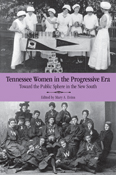Tennessee Women in the Progressive Era
Toward the Public Sphere in the New South

- Author(s): Evins, Mary A.
- Series:
- Imprint: Univ Tennessee Press
- Publication Date: 2013-07-30
- Status: Active
- Available in Hardcover - Cloth: Price $44.00 | Buy Now
- Leaf eReader required for PDF ebooks
Discussions of Tennessee women’s history during the Progressive Era tend to focus narrowly on the critical issue of suffrage and the ratification of the Nineteenth Amendment. While the achievement of Tennessee’s suffragists remains a feather in the state’s historic cap—pushing the legislature to cast the votes that settled the issue for the nation—reform-minded Tennessee women in the late-nineteenth and early-twentieth centuries participated in a wide range of other public-sphere activities. The first exploration of the work and lives of Progressive Era Tennessee women beyond their involvement in the battle for the right to vote, this pioneering compilation provides a fuller portrait of the work undertaken by these bold activists to improve the lives of their fellow citizens.
Ranging in subject matter from the role of women’s missionary organizations and efforts to end lynching to the challenges of agricultural reform and the development of stronger educational institutions, these essays consider a wide variety of reform efforts that engaged progressive women in Tennessee before, during, and after the suffrage movement. Throughout, the contributors emphasize the influence of religion on women’s reform efforts and examine the ways in which these women expanded their public roles while at the same time professing loyalty to more traditional models of womanhood. In demonstrating Tennessee women’s engagement with politics long before they had the vote, ran for office, or served on juries, these essays also support the argument that a broader definition of “politics” permits a fuller incorporation of women’s public activities into U.S. political history.
By focusing on the actual work reform-minded women performed, whether paid employment or volunteer efforts, this anthology illustrates myriad ways in which these individuals engaged their communities and reveals the motivations that drove them to improve society. Marshaling precise and detailed evidence that illuminates the meanings of progressivism to Tennessee’s female activists, the essays in this valuable compendium connect Tennessee women to the larger movements for reform that dominated the early-twentieth-century American experience.
